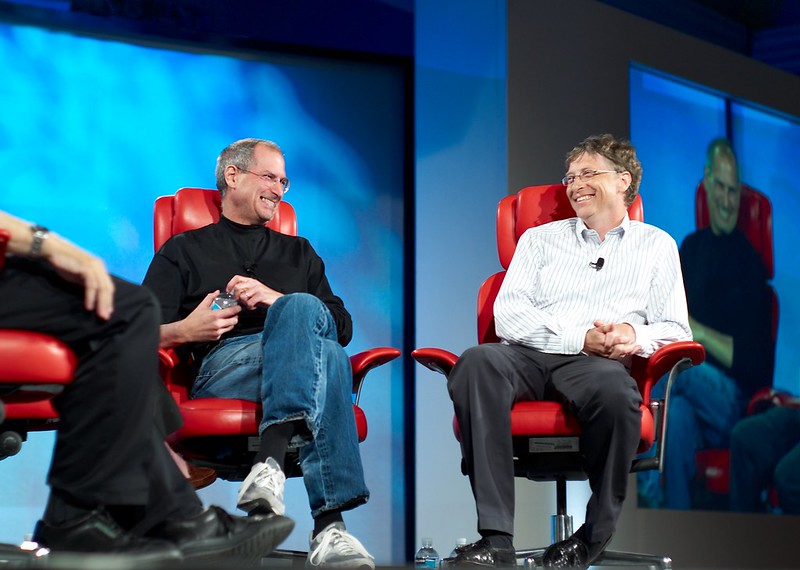Successful entrepreneurs are frequently nonconformists. They swim against the current and are often perceived as difficult by others. Even as young people, many of them had problems bowing and scraping to authority figures. Entrepreneurs such as Bill Gates and Steve Jobs were able to captivate, motivate and inspire their employees. In this respect, they fit the profile of outstanding leaders. But they also had a different side and were extremely difficult bosses.
Flame Mails from Bill Gates
In some respects, Bill Gates is the exact opposite of the executive championed in books on leadership. James Wallace and Jim Erickson wrote a biography of Bill Gates and described him as a difficult person. Gates was notorious for sending e-mails to his employees in the middle of the night (often, they would still be at work). A typical missive would start: “This is the stupidest piece of code ever written.” His employees referred to them as “flame mail” because they were “blunt and often sarcastic.”
In discussions, his biographers report, he wielded his formidable intellect like a blunt instrument. He could be rude and sarcastic, even insulting when he wanted to make a point. “Once the flaw was pinpointed, he would rip the person to shreds.” Gates would often rock back and forth in his chair, staring into space as if his thoughts were elsewhere. “Then suddenly, when he heard something he didn’t like or didn’t agree with, he would stop rocking, sit up straight, and become visibly angry, sometimes throwing his pencil. He often yelled or pounded his fist on the table to make a point.”
The Rebel Steve Jobs
Apple founder Steve Jobs is another prime example. Working for him, his biographers Jeffrey S. Young and William L. Simon write, was like being on a seesaw between finding Steve annoying, frustrating, intolerable, and yet answering his clarion call, marching to the beat of his drum, willingly, even gladly. Jobs carried an aura of fear with him like a dark cloud. “You didn’t want to be called in front of him to do a product presentation because he might decide to lop off the product, and you with it. You didn’t want to encounter him in a hallway because he might not like an answer you gave and would say something so demeaning that it could undermine your confidence for weeks. And you sure as hell didn’t want to be trapped on an elevator with him because by the time the doors opened, you might not have a job.”
Steve Jobs was a rebel in his youth, someone who kept picking fights with his parents and teachers. Because of his bad behaviour and unruliness, he was repeatedly suspended from school. He refused to do his homework, which he considered a waste of time and, as Steve Jobs himself confesses: “I was pretty bored in school, and I turned into a little terror.” He was the leader of a gang that planted bombs and put snakes into classrooms. “You should have seen us in third grade,” he recalls. “We basically destroyed the teacher.”
Larry Ellison and Warren Buffett’s Difficult Youth
Like Jobs, Larry Ellison, who founded Oracle and today stands at No. 7 on the Forbes list of the world’s richest individuals, was a very difficult child and teenager. He and his father argued incessantly. The only thing Ellison and his father ever did was disagree, his biographer Mike Wilson says. The arguments continued at school, where Ellison would stand up to his teachers. He was not willing to learn anything he could not see the point of and would sabotage whatever he did not want to put up with. After he had finished school, his attitude kept getting him into trouble at the companies he worked for. He eventually realised that his only option was to form his own company where he would be in control of how things were done.
Warren Buffett also had a lot of fights with his parents and his teachers — he even got into trouble with the police. Looking back on his youth, he readily admits he was “antisocial.” His biographer, Alice Schroeder, quotes him as saying: “I fell in with bad people and did things I shouldn’t have. I was just rebelling. I was unhappy.” Warren’s parents were appalled by his behaviour. By late 1944, Schroeder says, he had become the school delinquent. He kept getting bad grades, and he was so difficult to get along with that his teachers ended up putting him in a room by himself, shoving his “lessons under the door like Hannibal Lecter. ... I was really rebelling. ... I set the record for checks on deficiencies in deportment and all that,” Buffett remembers. On graduation day, Buffett refused to wear the obligatory suit and tie. “They wouldn’t let me graduate with the class ... because I was so disruptive and I wouldn’t wear clothes that were appropriate.”
Schumpeter: Entrepreneurs Need to be Nonconformists
Non-conformity, a willingness to face conflicts head-on, rebelling against authorities — all this corresponds to the picture painted by the Austrian economist Joseph Schumpeter 100 years ago in his work The Theory of Economic Development. Of central importance is the insight that entrepreneurs do not let social norms govern their actions to the same extent as others. The type of entrepreneur described by Schumpeter swims “against the stream.” “The fact that something has not yet been done is irrelevant to him as a counterargument. He does not feel the inhibitions which otherwise constrain the behaviour of economic agents.” This type “draws other conclusions from the data of the world around him than those drawn by the mass of static economic agents.” This entrepreneurial type is “quite indifferent … to what his peers and superiors would have to say about his business.”
Many Entrepreneurs are Misfits
Robert Hisrich, Janice Langan-Fox and Sharon Grant have all dealt with the psychology of successful entrepreneurs. They go a step further: “Entrepreneurs ‘break the mould’ by rejecting society’s prevailing norm of seeking employment with another organisation or person. Many entrepreneurs are misfits, difficult employees who start their own firms because they are unwilling to submit to authority and find it difficult to work in a pre-structured environment.” Of course, not every misfit or nonconformist goes on to become a successful entrepreneur. On the contrary, many fail in their professional lives precisely because they are perceived as difficult by their bosses and colleagues. Nevertheless, as the examples above clearly demonstrate, being a nonconformist or misfit earlier in life is often a prerequisite for subsequent entrepreneurial success.
About the author
Dr Rainer Zitelmann is a historian and sociologist. He is also a world-renowned author, successful businessman and real estate investor. This article is based on his book - Dare to be Different and Grow Rich: Secrets of self-made people who became rich and successful (http://daretobedifferentandgrowrich.com/) which was published in 2019.











